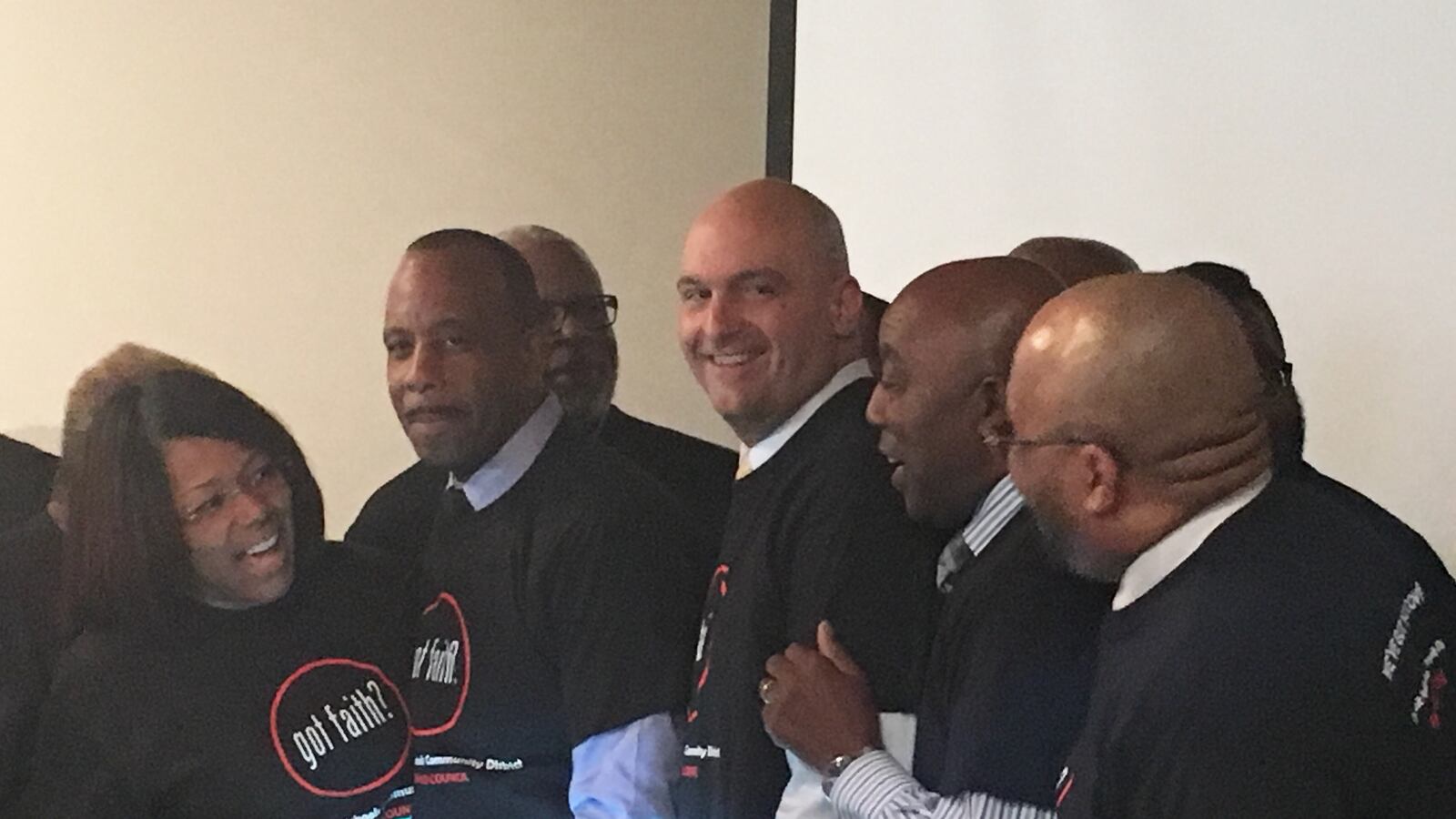Each Detroit public school might soon have its own church, synagogue, mosque, temple, chapel, or parish as a partner.
The district on Thursday announced an initiative to connect every district school with a faith-based community partner to help with academic support, student basic needs, and personal and career development, among other services.
The district is now trying to determine which schools have a defined partnership with a religious institution, but estimates that 25 to 30 percent of schools already do. Sharlonda Buckman, senior executive director of family and community engagement, said that the district hopes that, by the end of the year, every one of its 106 schools “has a religious partner working with them in tandem toward the goal of helping our children achieve.”
The program was announced at a press conference at the N’Namdi Center for Contemporary Art in Midtown, attended by educators, school board members, and invited guests.
“It doesn’t surprise me when I look around the room and see our religious leaders, because you guys, for a long time, have been investing in our children and our people, and it’s been an informal effort,” Buckman said. “You’ve worked with a number of our schools across the district, so today we recognize that we don’t need to do it informally anymore — we need to make this a formal part of how we move this district forward.”
The district is not unique in its approach: church-school partnerships are common across the country and in the state. The national partnering organization Kids Hope USA is based near Holland, Michigan. Supporters believe that stronger faith-school ties will not only improve local support for schools, but also help provide vital services for children and a more stable personal and family foundation upon which learning could take place.
District leaders “cannot lift our children up to their full potential by themselves,” Superintendent Nikolai Vitti said at the press conference. “We need help in that work.”
The district is looking to the faith-based partners to provide services such as tutoring, coaching, chaperoning; deliver before and after school support; donate uniforms and other goods; and highlight teachers at their institutions through announcements and bulletins.
R. Khari Brown, a professor of sociology at Wayne State, said the faith community is already deeply ingrained in Detroit in a variety of ways.
“There are a lot of community centers that closed down over the years in the city, and most churches in the city provide some sort of programming,” he said. “They provide backpacks and school supplies, so [the partnership] makes sense.”
Religion is also a large part of the culture of many African Americans, he said, and a significant force in a district where 81 percent of the students were black in 2016-2017.
“Most African Americans want their churches to be involved on the ills that disproportionately affect black people.” he said.
While other communities might balk at such intermingling of church and state, Brown said he believes that it is a “non issue” in this case because the religious institutions are not receiving money from the district.
The ACLU of Michigan said it had no comment at this time but that the organization hopes to “continue to learn more” about the district’s initiative.
Vitti said a more explicit district-faith community partnership could provide both protection and support for Detroit’s children.
“What I’m talking about is developing a stronger safety net to ensure that what students are not receiving in homes, what students are not receiving in school, can be addressed through the faith-based community,” Vitti said. “When we go back to when the city was at its peak, we worked together as a team to lift children up. When children fell through the cracks, there was a safety net to catch them and lift them back up. That happened through the school system, through the churches, the synagogues.”
Vitti said the initiative is part of his larger effort to align schools and the community more closely. Since starting in his position as superintendent in May of last year, he has been pressing programs like the parent academy.
The academy will provide parents with lessons on subjects like what to ask during parent-teacher conferences, how to create stronger readers, how to fill out FAFSA paperwork, and even how to print a resume. Vitti said most of all, it would empower parents to pursue educational goals for their children, even if they weren’t the best students themselves.
“Every parent knows education is important, but parents don’t know how to navigate the system often, and they feel hypocritical when they push their children when they know they didn’t do well in school,” he said.
Vitti said he envisions a time when faith-based institutions could house some of the parent services.
He said he also sees the faith community working side by side with the district’s 5,000 role models initiative. The program is recruiting volunteers to work with middle and high school African American and Hispanic students, and plans to have sponsors in each school to work with students daily, taking them on field trips and providing an open line of communication.

